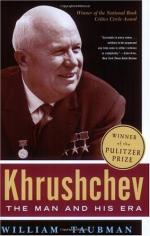|
This section contains 640 words (approx. 2 pages at 400 words per page) |

|
Khrushchev Summary & Study Guide Description
Khrushchev Summary & Study Guide includes comprehensive information and analysis to help you understand the book. This study guide contains the following sections:
This detailed literature summary also contains Topics for Discussion and a Free Quiz on Khrushchev by William Taubman.
Nikita Sergeevich Khrushchev rises from a peasant background and survives massive purges of his contemporaries to rule absolutely the world's second super power from the mid-1950s to 1964. He becomes a symbol of Russian uncouthness, remembered forever as the lout who banged his shoe at the United Nations. He is also remembered - and he wanted to be remembered - as the man who took the cover off the horrors of Stalinist Russia, emptied the gulag, and for a while allowed literature to flourish.
Khrushchev is born a peasant in 1894, and will always feel tied to the land but will struggle to escape the uneducated peasant mindset. At age 14 he moves to the industrial town of Yuzovka, where he succeeds as a metalworker, marries, begins a family, and becomes involved in radical politics. His involvement in politics diverts him from the education he badly wants and which might have led to a successful career as an engineer or manager.
Khrushchev does well in assignments in the Donbas Region, Kazan, and Kiev, and then experiences a meteoric rise in Moscow's communist party hierarchy despite mediocre performances. The timing of his arrival in Moscow is perfect: Stalin is purging Lenin's Old Guard, creating opportunities for younger players. He enters Stalin's inner circle and appears unthreatening enough to survive while colleagues are perishing. As ruler of Moscow, he is directly responsible for arrests and executions, although he will forever deny such a role, declaring variously that he knew nothing, trusted the party's wisdom, or was powerless to help others.
Before World War II, Stalin sends Khrushchev to control the Ukrainian government and incorporate the western regions seized from Poland under the Soviet-Nazi non-aggression pact. When Hitler double-crosses Stalin, Khrushchev serves as a lieutenant general in the Red Army, and is actively involved in both the major defeats and victories in the southern theater. After the war, he directs the brutal Sovietization of Western Ukraine before being summoned back to the Kremlin as part of Stalin's innermost circle.
Within three years of Stalin's death in 1953, Khrushchev purges secret police chief Beria and outmaneuvers his remaining challengers to consolidate power. In 1956, Khrushchev denounces Stalin and tentatively begins revealing the horror of purges and labor camps, creating a literary thaw he has trouble controlling. Strict ideological adherence to Marxism-Leninism misleads Khrushchev both in agriculture and international affairs. Schemes to introduce corn to the virgin lands prove a long-term disaster, and his open bragging that the USSR will overtake the U.S. in cattle production is an embarrassment. Sincere efforts to improve the people's standard of living never pan out, and in one case lead to massive protests that have to be dealt with in Stalinesque fashion. Confidence in nuclear weapons -- for purposes of bluster only -- leads him to downsize the Red Army, alienating the military, and setting him up to ship missiles to Cuba to prevent a repetition of the Bay of Pigs invasion. Khrushchev miscalculates the U.S. reaction, and the world is brought to the brink of nuclear confrontation before Khrushchev backs down. His hopes for broad-based dytente die with John F. Kennedy, Khrushchev's adversary-turned-partner, and a final break with Mao's China leaves him even more vulnerable to criticism inside the Presidium.
By 1964, the always brusque, crude, entertaining Khrushchev has grown so caustic, arbitrary, and isolated from his party colleagues, and so inattentive to the danger of being away from the Kremlin for extended periods, that a plot to overthrow him can be organized and executed to perfection. Khrushchev goes into a depressed internal exile but eventually uses the time to dictate extensive memoirs that his son has published in the West. After a series of heart attacks, Khrushchev dies in 1971 and is buried simply in the cemetery that holds many Russian notables, without communist pomp and circumstance.
Read more from the Study Guide
|
This section contains 640 words (approx. 2 pages at 400 words per page) |

|



